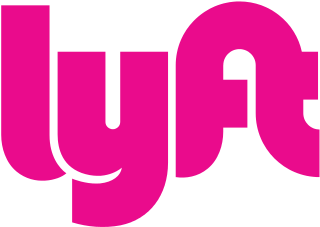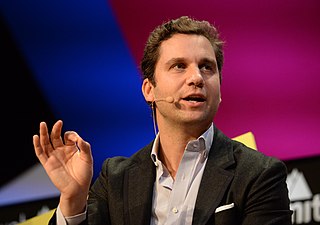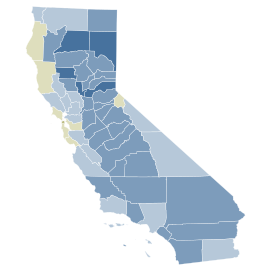Related Research Articles

Carpooling is the sharing of car journeys so that more than one person travels in a car, and prevents the need for others to have to drive to a location themselves.

Google Ads is an online advertising platform developed by Google, where advertisers bid to display brief advertisements, service offerings, product listings, or videos to web users. It can place ads both in the results of search engines like Google Search and on non-search websites, mobile apps, and videos. Services are offered under a pay-per-click (PPC) pricing model.
Out-of-home (OOH) advertising, also called outdoor advertising, outdoor media, and out-of-home media, is advertising experienced outside of the home. This includes billboards, wallscapes, and posters seen while "on the go". It also includes place-based media seen in places such as convenience stores, medical centers, salons, and other brick-and-mortar venues. OOH advertising formats fall into four main categories: billboards, street furniture, transit, and alternative.
Online advertising, also known as online marketing, Internet advertising, digital advertising or web advertising, is a form of marketing and advertising which uses the Internet to promote products and services to audiences and platform users. Online advertising includes email marketing, search engine marketing (SEM), social media marketing, many types of display advertising, and mobile advertising. Advertisements are increasingly being delivered via automated software systems operating across multiple websites, media services and platforms, known as programmatic advertising.
Contextual advertising is a form of targeted advertising for advertisements appearing on websites or other media, such as content displayed in mobile browsers. In context targeting, advertising media are controlled on the basis of the content of a website using linguistic elements. The advertisements themselves are selected and served by automated systems based on the context of what a user is looking at.
Microsoft Advertising is a service that provides pay per click advertising on the Bing, Yahoo!, and DuckDuckGo search engines. In 2021, Microsoft Advertising surpassed US$10 billion in annual revenue.

Lyft, Inc., based in San Francisco, California, offers mobility as a service, ride-hailing, vehicles for hire, motorized scooters, a bicycle-sharing system, rental cars, and food delivery in the United States and select cities in Canada. Lyft does not own any vehicles; instead, it receives a commission from each booking. Fares are quoted to the customer in advance but vary using a dynamic pricing model based on the local supply and demand at the time of the booking.

John Zimmer is the co-founder and president of Lyft, an on-demand transportation company, which he founded with Logan Green in 2012.

Zimride by Enterprise Holdings is an American carpool program that matches inter-city drivers and passengers through social networking services. It is offered to universities and businesses as a matchmaking service. The company was founded in May 2007. After the launch of the Lyft app in May 2012 for intra-city rides, the Lyft app rapidly grew and became the focus of the company. Zimride officially renamed as Lyft in May 2013, and the Zimride service was sold to Enterprise Holdings in July 2013. As of July 2013, the service had over 350,000 users and has partnerships with Facebook and Zipcar.
Sidecar was a US-based vehicle for hire company that provided transportation and delivery services. It was founded in 2011 in San Francisco and closed on December 31, 2015.

A ridesharing company is a company that, via websites and mobile apps, matches passengers with drivers of vehicles for hire that, unlike taxicabs, cannot legally be hailed from the street.
Many communities, governments, and organizations have established rules and regulations that specifically govern ridesharing companies. In some jurisdictions, for-profit ridesharing operations are completely illegal. Regulations can include requirements for driver background checks, fares, the number of drivers, and licensing.
A robotaxi, also known as robo-raxi, self-driving taxi or driverless taxi, is an autonomous car operated for a ridesharing company.
asterRIDE is a referral company that operates and markets transportation services on behalf of limousine and taxi operators across the cities where they operate. AsterRIDE markets their web platform and mobile app asterRIDE, which connects passengers with taxi drivers. As of June, 2015, asterRIDE was available in ten U.S. cities and growing: Chicago, Everett, Fort Lauderdale, Los Angeles, Miami, Naples, Orlando, Phoenix, San Diego, San Francisco, Seattle, and West Palm Beach. According to a release on their website, Las Vegas, New York City, Houston, and Philadelphia were to be added.

Vugo is a rideshare advertising company that markets ads on billboards on top of vehicles for hire. Headquartered in Minneapolis, Minnesota, the company is the first to develop in-car advertising for the rideshare marketplace.

Harry Kargman is an American entrepreneur. Kargman is founder and CEO of Kargo Global, Inc., a firm that manages mobile brand advertising for many media companies including CBS Interactive, Hearst, The Daily Mail, Meredith, Scripps, Target Corporation, T-Mobile, Vice, and Vox. Kargman holds numerous patents and is a member of Ad Council's Board of Directors.
Innovid is an online advertising technology company that offers services used by advertisers and publishers for the distribution and management of digital ads. Originally launched as a video marketing platform, the company expanded its offering to include display and digital out-of-home when Herolens was acquired in 2019.
A series of general strikes was coordinated on March 25, 2019 by Lyft and Uber drivers in Los Angeles, San Diego and San Francisco, California, United States led by rideshare advocate group Rideshare Drivers United. The strikes aimed to protest low wages, long hours, working conditions, and lack of benefits. The event was planned following Lyft's initial public offering. A second strike took place on May 8, 2019 in anticipation of Uber's initial public offering. The strike in response to Uber's IPO took place in 25 major cities across the United States, and were also joined by drivers in other locations worldwide where Uber operates.

Advertising revenue is the monetary income that individuals and businesses earn from displaying paid advertisements on their websites, social media channels, or other platforms surrounding their internet-based content. In September 2018, the U.S Internet advertising market was estimated to be worth $111 billion, with market share being held mostly between Google, Facebook, Amazon, and Microsoft. These companies earn revenue through online advertising but also have initiated pathways for individual users and social media "influencers" to earn an income. Individuals and businesses can earn advertising revenue through advertisement networks such as Google AdSense, YouTube monetization, or Outbrain.

Proposition 22 was a ballot initiative in California on the November 2020 state election which passed with 59% of the vote and granted app-based transportation and delivery companies an exception to Assembly Bill 5 by classifying their drivers as "independent contractors", rather than "employees", thereby exempting employers from providing the full suite of mandated employee benefits while instead giving drivers new protections of:
References
- ↑ Johnson, Lauren (April 14, 2015). "This Startup Plans to Sell Advertising in Uber and Lyft Cars". Adweek.com. Retrieved July 16, 2015.
- 1 2 3 Caompbell, Harry (31 March 2015). "Video Ads Are Coming To The Back Of Your Uber". Forbes. Retrieved 16 July 2015.
- ↑ "A startup is putting ads inside Ubers and Lyfts - Digiday". digiday.com. April 2019. Retrieved 2019-06-05.
- ↑ Inc, Gallup (25 July 2018). "Snapshot: Who Uses Ride-Sharing Services in the U.S.?". Gallup.com. Retrieved 2019-06-05.
- ↑ "These 2 Advertising Startups Offer Uber Drivers Yet More Side Hustle". 2018-04-13.
- ↑ "Firefly raises $21.5 million for digital ad displays on rideshare drivers' cars". VentureBeat. 2018-12-06. Retrieved 2019-06-05.
- ↑ "VUGO - Rideshare Advertising & Marketing". VUGO - Rideshare Advertising & Marketing. Retrieved 2020-07-16.
- ↑ Woodward, Curt (June 1, 2015). "Startups aim to put video ads in ride-sharing cars". Boston Globe. Retrieved July 16, 2015.
- ↑ O'Reilly, Lara (May 11, 2015). "Uber says it will 'discourage' its drivers from earning extra cash by placing ads in their cars". Business Insider. Retrieved July 16, 2015.
- ↑ "Uber partners with Cargo to help drivers make money by selling stuff to riders". TechCrunch. Retrieved 2019-06-05.
- ↑ Wamsley, Laurel (8 May 2019). "Uber And Lyft Drivers Are Striking — And Call On Passengers To Boycott". NPR.org. Retrieved 2019-06-05.
- ↑ "Uber Drivers – How To Sell Advertising Space Around Your Car". The Rideshare Guy Blog and Podcast. 2018-12-12. Retrieved 2019-06-05.
- ↑ WJLA, Sam Sweeney (2019-05-16). "Uber, Lyft drivers manipulate fares at Reagan National causing artificial price surges". WJLA. Retrieved 2019-06-05.